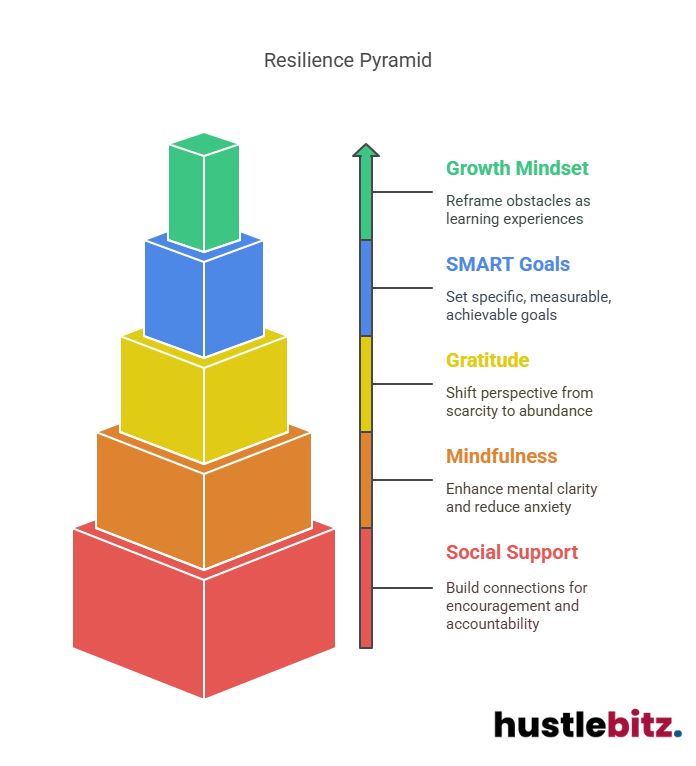Turning obstacles into opportunities is vital for staying motivated during tough times. Embracing a positive mindset allows you to reframe challenges as avenues for growth. Cultivating resilience through practices like journaling and building strong social connections provides essential support. Engaging in self-care and gratitude practices enhances overall well-being, boosting motivation. Visualization and affirmations reinforce a positive self-image, empowering proactive problem-solving. By developing adaptability and enhancing mental clarity through mindfulness, you can navigate uncertainties with confidence. These strategies not only enhance motivation but also foster personal development and resilience in adversity, revealing further insights into efficient approaches.
Key Takeaways
- Reframe obstacles as learning experiences to cultivate a growth mindset and foster resilience in tough times.
- Set SMART goals to maintain focus and provide direction, making challenges manageable and motivating progress.
- Practice gratitude to shift your perspective from scarcity to abundance, boosting morale and recognizing achievements.
- Utilize mindfulness techniques to enhance mental clarity, reduce anxiety, and improve decision-making during challenging situations.
- Build strong social connections for support and accountability, helping to navigate adversity with encouragement from others.

The Nature of Obstacles

Obstacles are inherent challenges that not only test our resilience but also present opportunities for growth and self-discovery. The perception of an obstacle significantly influences our ability to navigate it effectively. By reframing these challenges as stepping stones rather than barriers, individuals can cultivate a growth mindset that fosters resilience and adaptability. This shift in obstacle perception is crucial in overcoming fear; when we view challenges as essential components of personal development, we reduce the paralyzing effects of anxiety and uncertainty.
Challenge acceptance is a pivotal element in this process. Acknowledging that obstacles are a natural part of life empowers us to face them head-on, rather than evade or deny their existence. This acceptance facilitates the implementation of effective problem-solving strategies, allowing us to approach each situation with a proactive attitude. Instead of feeling overwhelmed, we can dissect the obstacle into manageable components, exploring various solutions and potential outcomes.
Furthermore, adopting a growth mindset encourages continuous learning and self-improvement. It instills a belief that our abilities can be developed through dedication and hard work. Consequently, this mindset transforms obstacles into valuable lessons that enhance our problem-solving capabilities.
The Power of a Positive Mindset

Cultivating a positive mindset is essential for overcoming challenges and fostering resilience during difficult times. A positive mindset not only alters one’s perception of obstacles but also enables the individual to harness their full potential. By implementing mindset shifts, individuals can transform limiting beliefs into empowering thoughts, paving the way for personal growth and resilience.
One effective method for fostering a positive mindset is through a gratitude practice. By acknowledging and appreciating the positive aspects of life, individuals can shift their focus from what is lacking to what is abundant. Additionally, visualization techniques can help individuals envision their success and motivate them to take actionable steps toward their goals.
Affirmations power plays a significant role in reinforcing positive self-beliefs. Regularly affirming one’s capabilities can significantly alter self-talk strategies, reducing self-doubt and increasing self-efficacy. Below is a table summarizing these techniques:
| Technique | Description | Benefits |
| Mindset Shifts | Changing limiting beliefs to empowering thoughts | Increases resilience |
| Gratitude Practice | Recognizing positive aspects of life | Enhances overall well-being |
| Visualization Techniques | Envisioning success and desired outcomes | Boosts motivation and clarity |
| Affirmations Power | Regular positive self-statements | Reduces self-doubt |
| Self Talk Strategies | Constructive internal dialogue | Improves confidence and focus |
Incorporating these strategies into daily life can significantly enhance one’s ability to navigate through adversity, turning challenges into opportunities for growth.
Cultivating Resilience in Adversity

Building resilience during challenging times is crucial for individuals seeking to maintain their well-being and navigate life’s difficulties effectively. Resilience building enables individuals to not only withstand adversity but also to emerge stronger and more competent. This process is vital in overcoming challenges, as it equips individuals with the emotional strength necessary to tackle obstacles head-on.
An adaptive mindset is fundamental in cultivating resilience. This mindset fosters a proactive approach to problems, allowing individuals to reinterpret setbacks as opportunities for learning and growth. Rather than succumbing to despair, those who embrace an adaptive mindset can reframe their experiences, facilitating personal growth and enhancing their capacity to cope with future adversities.
Moreover, resilience is not merely an innate trait; it is a skill that can be developed through intentional practice. Engaging in reflective practices, such as journaling or mindfulness, promotes self-awareness and emotional regulation, enabling individuals to respond more effectively to stressors. Building strong social connections further enhances resilience, as support systems provide critical resources during difficult times.
Ultimately, cultivating resilience in adversity is a transformative journey. By fostering an adaptive mindset and embracing resilience building techniques, individuals can navigate the complexities of life with greater confidence. This not only aids in overcoming challenges but also contributes to a deeper sense of fulfillment and personal growth, ensuring that they are better prepared for whatever life may present in the future.
Staying Motivated in Tough Times
Maintaining motivation during challenging periods is a vital aspect of leveraging resilience, as it empowers individuals to persist in the face of adversity and pursue their goals with determination. To stay motivated, it is essential to integrate various strategies into daily routines that nurture both mental and emotional well-being.
Effective goal setting serves as a fundamental tool in maintaining focus and direction. By establishing clear, achievable objectives, individuals can measure progress and adjust their approaches as needed. Additionally, incorporating self-care practices, such as regular exercise, sufficient rest, and healthy nutrition, supports overall well-being and enhances motivation.
Establishing robust support networks is another critical component. Surrounding oneself with positive influences fosters encouragement and accountability. Furthermore, cultivating a gratitude practice can shift perspectives, allowing individuals to recognize and appreciate their achievements, no matter how small.
Mindfulness techniques, such as meditation or deep-breathing exercises, can also aid in maintaining motivation by promoting mental clarity and reducing anxiety. Below is a table summarizing these key strategies:
| Strategy | Description | Benefits |
| Goal Setting | Establish clear objectives | Provides focus and direction |
| Self Care | Prioritize health through exercise and nutrition | Enhances physical and mental wellness |
| Support Networks | Engage with positive, encouraging individuals | Increases motivation and accountability |
| Gratitude Practice | Acknowledge and appreciate achievements | Shifts perspective, boosts morale |
Embracing Change and Uncertainty

Embracing change and uncertainty is essential for personal growth, as it encourages individuals to adapt and thrive in ever-evolving circumstances. In a world characterized by rapid transformation, the ability to accept change becomes a fundamental skill. Change acceptance not only alleviates resistance but also fosters a proactive approach to life’s challenges.
By cultivating adaptability skills, individuals can navigate the complexities of their environment with confidence and resilience.
Uncertainty management is another crucial aspect of this process. Rather than fearing the unknown, individuals must learn to view uncertainty as an opportunity for exploration and innovation. This perspective is integral to developing a robust growth mindset, where challenges are perceived as vehicles for learning and skill enhancement.
Flexible thinking further supports this mindset by allowing individuals to pivot and adjust their strategies in response to shifting circumstances.
The intersection of change acceptance, uncertainty management, adaptability skills, and flexible thinking creates a powerful framework for personal and professional development. As individuals embrace these elements, they become equipped to transform obstacles into opportunities, harnessing the potential of each situation.
This journey not only enhances one’s capacity to deal with adversity but also enriches overall life experiences. By actively engaging with change and uncertainty, individuals position themselves for long-term success and fulfillment, ultimately leading to a more dynamic and resilient existence.
Techniques for Staying Focused
Navigating change and uncertainty can often lead to distractions that hinder productivity, making it imperative to adopt effective techniques for staying focused. Mastery in focusing requires an integrated approach that combines time management, goal setting, and mindfulness practices to optimize performance.
Firstly, effective time management is crucial. Employing techniques such as the Pomodoro Technique—where work is divided into intervals, separated by short breaks—can enhance concentration and minimize burnout. Coupling this with clear goal setting allows individuals to prioritize tasks, ensuring that they remain aligned with their overarching objectives. Specific, measurable, achievable, relevant, and time-bound (SMART) goals serve as a roadmap, guiding efforts and maintaining focus amidst distractions.
Incorporating mindfulness practices can significantly bolster concentration. Techniques such as meditation or focused breathing exercises enhance mental clarity and reduce anxiety, allowing individuals to engage fully in their tasks. This heightened awareness fosters a state where distractions are minimized, and productivity is maximized.
Furthermore, leveraging accountability partners can provide an additional layer of motivation. Engaging with peers or mentors who share similar goals can create a sense of responsibility, encouraging sustained focus and commitment. Regular check-ins can serve to reinforce dedication and track progress.
Lastly, implementing productivity hacks—such as decluttering your workspace or utilizing digital tools for task management—can streamline efforts, reducing cognitive load. By adopting these techniques, individuals can transform distractions into opportunities for enhanced focus and productivity, even in challenging times.
Final Thoughts
Turning obstacles into opportunities requires a proactive mindset and effective strategies to stay motivated during tough times. By embracing challenges, cultivating resilience, and maintaining a positive outlook, individuals can not only overcome adversity but also grow from it. Setting clear goals, practicing mindfulness, and building strong support networks are key to staying focused and motivated. Through adaptability and intentional self-care, challenges become stepping stones for personal growth and success, leading to greater fulfillment in both personal and professional life.




